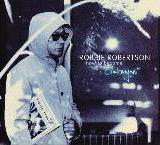Robbie Robertson Presents: How to Score an Audio Movie Page 2
Many Clairvoyant songs talk about you being in motion: You’re on a train, you’re transitioning through different phases, you’re reconciling certain things in your life. And since you’ve always been a visually oriented songwriter, I feel like I’m “watching” these songs unfold as I listen to them.
I’m glad they came across that way, because I’m also drawn to that in other people’s work. It has a lot to do with my connection to films over all these years. I’m painting pictures here. Sometimes the treatment of certain songs has to do more with scoring them, as opposed to just accompanying them.
Did you think of your specific guest collaborators as you were writing the songs? For example, were you thinking that the title track would be right for pedal-steel guitarist Robert Randolph or that “Axman” would be good for a raging Tom Morello guitar solo? Or did those ideas evolve organically?
They did evolve organically. In the same way a scene in a movie tells you what it needs more than you can predict what it needs, these songs were revealing themselves as I was writing and discovering them. That helped lead me in the right direction and to the players.
This album is an audio movie, for sure.
Yes. This is a real Sound + Vision record! [both laugh]
A good example of your “scoring” concept has to be “Madame X,” a track where Trent Reznor provides what you describe in the credits as “additional textures.” But first, I have to ask: Is the song title a callback to the character in “Somewhere Down the crazy River” [from 1987’s Robbie Robertson]?
You’re the first person who’s mentioned this to me. It was just an accident that it ended up with that title. It was something between Eric Clapton [who wrote the song] and myself that we ended up calling this “Madame X,” and it wasn’t until after the fact that I realized I had used a character called Madam X in “Somewhere Down the Crazy River.” [She’s cited in the lines, “You know, I think I’m gonna go down to Madam X / And let her read my mind.”] So it just goes to show you: You can’t escape your past.
As to the “additional textures,” I think it was about getting the thematic part of this song right — balancing its traditional, acoustic sense with the counterpoint of that very dusky sound. And I couldn’t imagine anybody doing it better than Trent, because he has a strong cinematic connection. It was a beautiful collaboration, so I guess it was good casting on my part.
I’d love to hear “Madame X” in surround sound, because there are so many layers to the recording.
That’s a very interesting idea. “Madame X” seems like the kind of song that will find itself in a movie at some point, and when it does, I’m going to recommend that it be done that way.




























































